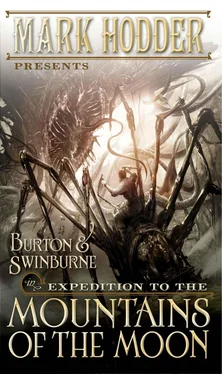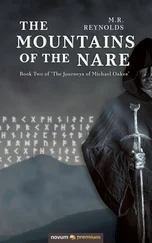Mark Hodder - Expedition to the Mountains of the Moon
Здесь есть возможность читать онлайн «Mark Hodder - Expedition to the Mountains of the Moon» весь текст электронной книги совершенно бесплатно (целиком полную версию без сокращений). В некоторых случаях можно слушать аудио, скачать через торрент в формате fb2 и присутствует краткое содержание. Жанр: sf_stimpank, на английском языке. Описание произведения, (предисловие) а так же отзывы посетителей доступны на портале библиотеки ЛибКат.
- Название:Expedition to the Mountains of the Moon
- Автор:
- Жанр:
- Год:неизвестен
- ISBN:нет данных
- Рейтинг книги:5 / 5. Голосов: 1
-
Избранное:Добавить в избранное
- Отзывы:
-
Ваша оценка:
- 100
- 1
- 2
- 3
- 4
- 5
Expedition to the Mountains of the Moon: краткое содержание, описание и аннотация
Предлагаем к чтению аннотацию, описание, краткое содержание или предисловие (зависит от того, что написал сам автор книги «Expedition to the Mountains of the Moon»). Если вы не нашли необходимую информацию о книге — напишите в комментариях, мы постараемся отыскать её.
Expedition to the Mountains of the Moon — читать онлайн бесплатно полную книгу (весь текст) целиком
Ниже представлен текст книги, разбитый по страницам. Система сохранения места последней прочитанной страницы, позволяет с удобством читать онлайн бесплатно книгу «Expedition to the Mountains of the Moon», без необходимости каждый раз заново искать на чём Вы остановились. Поставьте закладку, и сможете в любой момент перейти на страницу, на которой закончили чтение.
Интервал:
Закладка:
Burton said, “I read accounts of the speech in the newspapers. Is he warmongering?”
Palmerston clenched his fists. “Indisputably. It is the first blatant move toward the world war Countess Sabina has predicted. There is no doubt that Bismarck is seeking to establish a Germanic empire to rival our own. Empires require resources, Captain Burton, and there is one vast untapped resource remaining in the world. I refer to Africa.”
“So you suspect Bismarck will try to establish a foothold there?”
“I think he intends to carve it up and suck it dry.”
“But what has this to do with America's slaves?”
“If a united Germany can count Africa among its territories, and if war breaks out, it will find itself with an almost limitless source of expendable manpower.”
“Expendable?”
“I believe the term is ‘cannon fodder.’”
The king's agent felt ice in his veins. “You surely aren't suggesting-” he began.
Palmerston interrupted him. “If we are faced with such a situation, we will require our own disposable units.”
“You mean America's slave population?”
“Yes. A little over four million individuals, though I'm including women in that number.”
Burton's jaw flexed spasmodically. “Hellfire, man! You're talking about human beings! Families! You're not only suggesting support for state sanctioned slavery-you're talking about bloody genocide!”
“I mean to ensure the survival of the British Empire, whatever it takes.”
“No!” Burton shouted. “No! No! No!” He slapped his hand down on the leather arm of his chair. “I won't stand for it! It's despicable!”
“You'll do whatever you're damned well ordered to do, Captain Burton,” Palmerston said softly. “And what you are ordered to do is help me to ensure that no such circumstance ever arises.”
“Wha-what?”
“Your primary mission hasn't changed-you are to retrieve the Eye of Naga so that we might employ it to infiltrate and coerce the minds of our opponents. However, there is now a secondary purpose to your expedition. You are to employ your military and geographical experience to determine which are the most strategically advantageous African territories and how we might best secure them. I intend to claim that continent before Bismarck makes his move, and I'm relying on you to advise me how to do it.”
Burton's heart hammered in his chest. His mind raced.
He looked into Lord Palmerston's impenetrable eyes.
“And if I do, sir, and if we make Africa a part of the British Empire, then what of the inhabitants? What of the Africans?”
The prime minister-returning Burton's gaze steadily and without blinking-replied: “They will be accorded the rights granted to all British subjects.”
There was a moment of silence, broken only by Gregory Hare clearing his throat slightly, then Burton said, “You refer to the same rights enjoyed by those undernourished Britishers who toil in our factories and inhabit our slums? The same given to those who beg on our street corners and doorsteps? The same extended to servant girls abused and impregnated by their employers then thrown onto the streets where their only means of survival is prostitution? Is this the marvellous civilisation that you, the great imperialist, have to offer Africa?”
Palmerston shot to his feet and yelled, “Shut the hell up, Burton! Am I to endure your insolence every time we meet? I'll not tolerate it! You have your orders!” He stamped to the door, snapping his fingers at Burke and Hare. They rose and followed. He ushered them out first, then, with his hand on the doorknob, turned to face the explorer.
“Do your bloody job, Captain!” he snarled.
The prime minister stepped out of the room and slammed the door shut behind him.
“Illiterate baboon,” Pox squawked.
“In the maelstrom of making history,” Bertie Wells said, “very little of it is accurately recorded. When the time finally comes for an account of the events that have passed, human nature takes over.”
He and Burton were in an ambulance sharing that rarity of rarities, a scrounged cigar. The oxen-drawn vehicle was part of a convoy, a seemingly never-ending line of soldiers and vehicles moving up from the south toward the port of Tanga, some hundred miles north of Dar es Salaam.
It was early morning but already ferociously hot. The troops were dripping sweat. They were exhausted, ill, and miserable. Occasional bursts of chanting broke out-the usual sad native dirges-but these quickly tailed off, overwhelmed by the rhythmic tromp tromp tromp of boots. At one point a company of Britishers broke into song, their mock cheerfulness shot through with resentful hatred. The tune was “What a Friend We Have in Jesus,” but the lyrics were rather more colourful than those of the original hymn:
When this lousy war is over, no more soldiering for me,
When I get my civvy clothes on, oh how happy I shall be.
No more church parades on Sunday, no more begging for a pass.
You can tell the sergeant major to stick his passes up his arse.
The sergeant major in question harangued the men for a three-mile stretch after that.
Burton was sitting on the ambulance's tailgate, leaning against the side of the vehicle's open back. He couldn't stop scratching.
“Human nature?” he said. “What do you mean?”
Wells, perched on a bench just behind him, responded, “I'm of the opinion that we possess an inbuilt craving for narrative structure. We want everything to have a beginning, a middle, and an end. That way, we can make better sense of it.” He looked down at Burton. “How many days did that uniform last before it got infested?”
“Four. The lice are eating me alive.”
“Chin up, old man. It could be worse. Fever, trench foot, dysentery, having your bloody legs blown off-all the perils of wartime Africa.”
“Bismillah! What are you people doing? You've created hell from an Eden!”
“Is my generation responsible, Richard, or is yours? I've heard people say over and over that we are all products of the past. They'd lay the blame for this war squarely at their fathers' feet. In other words, welcome to the world you created.”
“Absolutely not! None of my contemporaries intended the creation of this Jahannam!”
“As you say. Besides, I disagree with the philosophy of what you might term sequentialism . The problem, as I see it, is that we don't truly understand the nature of the past. We mythologise it. We create fictions about actions performed to justify what we undertake in the present. We adjust the cause to better suit the effect. The truth is that the present is, and will always be, utter chaos. There is no story and no plan. We are victims of Zeitgeist. I apologise for using a German word, but it's singularly appropriate. Are you familiar with it?”
“Yes. It translates as ‘ghost tide,’ or, perhaps, ‘spirit of the age,’ and refers to the ambience or sociopolitical climate of any given period.”
“Exactly so, and in my view it's a phenomenon entirely independent of history. History doesn't create the zeitgeist, we create the history to try to explain the zeitgeist. We impose a sequential narrative to endow events with something that resembles meaning.”
The ambulance jerked as its wheels bounced through a pothole. Burton's head banged against the vehicle's wooden side.
“Ouch!”
“How's your arm?” Wells asked.
“Aching. How's your leg?”
“Broken. How's your head?”
“Shut up.”
“Have a cigar.”
The war correspondent passed what remained of the “Hoffman” to the explorer, who glanced at its much-reduced length and muttered, “Your lungs are healthy, at least.” He raised it to his lips and drew in the sweet smoke, savouring it while observing the column of men and vehicles that snaked back over the rolling landscape.
Читать дальшеИнтервал:
Закладка:
Похожие книги на «Expedition to the Mountains of the Moon»
Представляем Вашему вниманию похожие книги на «Expedition to the Mountains of the Moon» списком для выбора. Мы отобрали схожую по названию и смыслу литературу в надежде предоставить читателям больше вариантов отыскать новые, интересные, ещё непрочитанные произведения.
Обсуждение, отзывы о книге «Expedition to the Mountains of the Moon» и просто собственные мнения читателей. Оставьте ваши комментарии, напишите, что Вы думаете о произведении, его смысле или главных героях. Укажите что конкретно понравилось, а что нет, и почему Вы так считаете.












